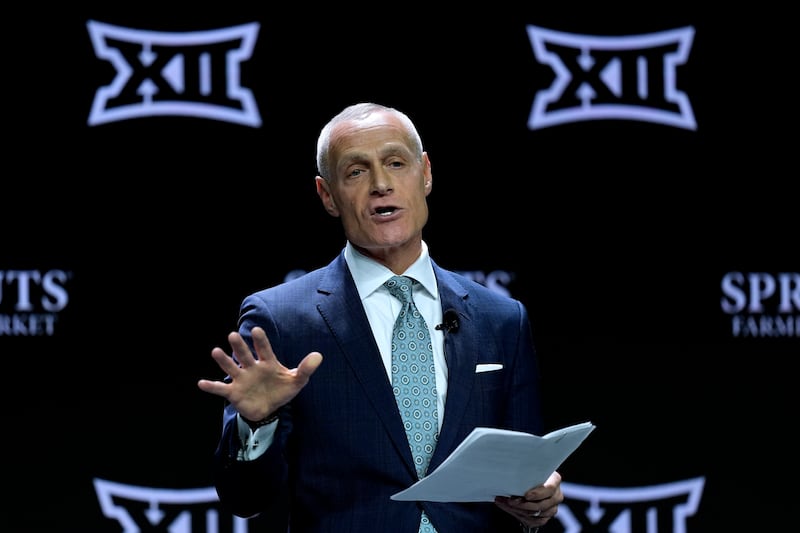It’s the killing of a league’s fortune.
Members of the College Football Playoff Committee couldn’t have disrespected the Big 12 more if they’d lined up all the coaches, players, athletic directors, presidents and commissioner and told them they’d wasted their time this fall.
The committee donned clown hats, got lazy.
Special Collector’s Issue: “1984: The Year BYU was Second to None”
Get an inclusive look inside BYU Football’s 1984 National Championship season.
The CFP guys put a tarp on the Big 12. They firmly pulled the rug out from under the league. They dissed Iowa State and Arizona State, and, by association, the once No. 6-ranked BYU and Colorado, one of the most popular TV franchises in the game the past two years.
But even more dangerous in this era of a 12-team playoff, the committee declared that Saturday’s conference championship game outcomes would not make a difference for the playoff field for anybody outside the currently 12-ranked field. In other words, teams are locked in and others are locked out (15th ASU, 16th Iowa State, 18th BYU).
This opens the door for top 12 CFP teams in conference title games to hold out players so they’ll be healthy for the CFP games.
Columnist Andy Staples asked No. 8 SMU coach Rhett Lashlee on his podcast if this means coaches will start doing crazy things. He answered, yes.
“If our team all got COVID and didn’t play (against Clemson this Saturday), we’re in. We are in. Right? We don’t have a data point to drop us below anybody who is behind us. If you open that door you are going to see coaches do crazy things. We aren’t going to, we’re going to go play in Charlotte. And we’re going to try and compete for the championship, that’s the right thing to do, that’s what competitors do. We value the opportunity to share the field with a team like Clemson.”
These guys placed teams with lesser strength of schedules and records ahead of Big 12 candidates. They made Big 12 teams pay dearly for losses when other schools like Alabama, Indiana, Mississippi and Boise State lost and barely got nicked. They placed teams like Boise State and SMU ahead of Big 12 teams who had to face far more dangerous opponents, actually ranked teams at the time played.
In short, the CFP slothfully said, “Hey, schools, get to 11 wins any way you can, through any schedule you can create, and you are our huckleberry. Smile for the cameras and ready your bank accounts.”
The Big 12 is the second toughest conference in the country behind the SEC, according to USA Today’s Jeff Sagarin.
But that doesn’t matter to the committee.
It’s a league that proved volatile to its leaders because of the quality of teams that could rise up and eat one another, as evidenced by Kansas, who lost six games by razor-thin margins in the final minutes, then rose up and beat league leaders BYU, Iowa State and Colorado.
Kansas essentially cost the Big 12 by being extremely good with a five-win record. This is called competition.
On the other hand, Boise State may have barely lost to No. 1 Oregon, but its spate of games in the modified Mountain West/Pac-12 survivor gauntlet was more of a garden stroll as opposed to a cutthroat fight for survival against highly ranked foes.
Boise State has lived off that “close loss” to Oregon all season and it helped that it came early. Meanwhile, a team like BYU with early-season wins over ranked SMU and K-State is penalized for losing at Big 12-title-bound ASU in Tempe on Senior Day by one score.
Indiana played and beat the worst teams in the Big Ten, then lost to the one league bully, Ohio State, 38-10. The CFP folks looked at that and called it a quality loss and ranked the Hoosiers No. 9 on Tuesday, ensuring the Big Ten four teams in the playoffs.
There’s no ignoring the plain and simple fact: The SEC and Big Ten are given far more consideration in rankings because of brand, as well as blatant favoritism by bloodline.
BYU’s strength of schedule is 44th, with two wins over ranked opponents, and stands 10-2. No. 12 Miami’s is 55th, yet they are in the playoff matrix with a 10-2 record and zero wins over a ranked foe. Both BYU and Miami have the same record and nine-point differential in losses and played in a tougher league.
The Athletic columnist Stewart Mandel tweeted that Miami dropped farther for losing on the road to an 8-3 team than Ohio State did for losing at home to a 6-5 Michigan team and only scored 10 points.
I’m not making the argument that former Big 12 leader BYU belongs in the CFP today after late-season losses. But when they lost absolutely proved to be costly. BYU was treated far differently than other top-10 teams who lost in November.
National pundits, like Kelly Ford, declared No. 18 BYU was under-ranked on Tuesday by six places.
Take the Clemson situation. Clemson is ranked ahead of BYU at No. 17, but the Cougars have a better record at 10-2 than Clemson’s 9-3 and better strength of schedule. Clemson lost to all three good teams it played (South Carolina, Louisville and Georgia). BYU beat Clemson’s ACC title game opponent SMU on the road and has a higher strength of schedule, 44th to 53rd.
This past week, the debate took to online barbs between Iowa State and SMU athletic directors. It was wide open and public.
“It’s disappointing that strength of schedule clearly does not matter for SMU, Indiana and Boise State,” tweeted ISU’s Jamie Pollard. “Message is clear — win as many games as possible regardless of who you play. Time to rethink non-conference scheduling. Very different standards than the basketball committee.”
His counterpart at SMU, Rick Hart, fired back on X: “Jamie, respect you but bad take. ISU had No. D, Iowa, Ark. State. Non.con. SMU had Nev. HCU, TCU, BYU. (And scrambled due to Vandy dropping us.) SMU 1 of 2 to win all conf. Games, 1 of 3 with 9 P4 wins, trailed a TOTAL of 6+ mins. Last 9 games. I could go on. Stay off my lawn.”
Pollard responded that SMU avoided four of the top five teams behind them in the ACC standings during the regular season. “Beat Clemson Saturday and I will respect your ranking. Until then you did not play Clemson, Miami, Georgia Tech or Syracuse AND lost to BYU at home. Looks like your lawn may be artificial.”
Love it. Take it to the streets.
But even this is a side issue. The Big 12 and ACC should be fighting the bigger battle: SEC and Big Ten bias by the CFP.
Texas Tech coach Joey McGuire said, “It is absolutely embarrassing what the committee is doing to the Big 12 conference. The Big 12 champion should be in the Final Four of the CFP.”
McGuire decried the SEC and Big Ten bias, loading the brackets with teams with brand patches on their jersey.
McGuire said if Texas wins the SEC, a former Big 12 team one year removed did it. If ASU wins the Big 12, a former Pac-12 team one year removed did it. If Oregon wins the Big Ten, a former Pac-12 team did it. And if SMU wins the ACC, a former team from the American Conference did it.
So, with this declaration, where are the SEC and Big Ten blue bloods?
Many thought an expanded 12-team playoff would fix many issues. It just made it worse because there are more opportunities for the CFP committee to plant favored programs and protect them — regardless of circumstances, like who played whom.
What can the Big 12 do?
Well, in simple terms, win more games.
You can do that by reconsidering the nine-game league schedule. It seems if you lose to an in-league foe in the heat of a conference chase, it will penalize you, as seen by Iowa State, Colorado and BYU losses to Kansas.
Schedule an eight-game league schedule and have teams add an out-of-conference foe, preferably somebody like Alabama did in Mercer where in November, the Crimson Tide rested a lot of starters. Hurts the strength of schedule, but apparently, SOS doesn’t matter to the committee.
Kansas State head coach Chris Klieman told the media in his weekly presser the Big 12 needs to change.
“Other teams can lose in other leagues and that league is really good. We lose in (the Big 12) and this league stinks. I don’t understand that,” Klieman said during his press conference on Monday.
“As a conference, we need to get together and figure some things out,” Klieman said. “Because for a bunch of teams to be (10-2 or 9-3) and us only get one of those teams in the College Football Playoff, then we’ve got to cancel one of these games. I don’t care what people say, we go to eight games in league play. Or we stay with nine but play an FCS team or play a Group of Five team.”
This would also mean another home game. SEC and Big Ten teams are scheduling seven or eight home games. Boy, that really does help.
Regardless, you can be sure Big 12 commissioner Brett Yormark is going to have a heated agenda in the offseason with his athletic directors.
The CFP made a big-time mess of his league.
Cleanup on Aisle 1 is needed.












